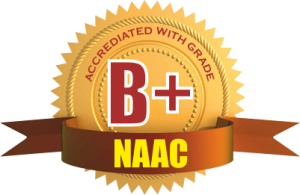Waste and E-waste management
To maintain clean and green campus is the top priority of our institute. Recognizing the importance of responsible waste management in contributing to a cleaner and healthier environment, the college has implemented a comprehensive Waste Management Policy.
- Solid Waste Management
The solid waste management is classified as degradable and non-degradable wastes. For the degradable solid waste management, we have open composting and vermicomposting plant. The usage of plastic is prohibited on campus. Waste containers/Dustbins are positioned where they are needed. The leaf litter, twigs of the plants are collected for practical in Botany Department and subjected to composting. Vermi-compost is harvested and used for plants as manure in campus garden. College has developed a technology-centric educational and administrative strategy to reduce solid waste. Non-degradable waste contains building debris, plastic, glass, metal scrap etc. Recyclable plastic, glass waste, metal scrap is sold to scrap merchant and building debris is used for land filling in the campus
- Liquid Waste Management
Due to rapid increase in demand for water among fast growing human population, there lies a great opportunity of harvesting rainwater to meet the scarcity of water and avoid destruction of the normal groundwater level. Rainwater harvesting is an important environment friendly approach. Rainwater and run-off water, stored in a planned way, can save the earth from soil erosion and flood and recharge the aquifers to increase the groundwater level. Rainwater harvesting is eco-friendly and economical.
In our college campus, rainwater harvesting system has been installed near 4 no. gate. The roof runoff water is collected through network of pipe lines and stored in the tanks. There are two tanks in the campus where the roof runoff water is stored. The total capacity of storage is 100,000 lit.(approx.) The remaining roof runoff water is allowed to infiltrate in the ground for recharge.
In the institute, there is a bore well near the entrance gate. The water from bore well lifted to tanks placed on roof and is distributed through network of pipelines to all over the campus. The bore well fulfils the daily requirement of water on the campus. Water bodies and tanks are maintained regularly. The waste water collected from RO is used for the cleaning and watering plants. gardening. Overflowing is prevented through alarm system.
A continuous water conservation programme is implemented to track use, prevent leakage, and remove excessive or unnecessary use. The institution shall promote efficient water use techniques, such as sprinkler or drip irrigation, in its gardening activities. To encourage reporting leaks and swiftly repairing them. College has appointed a staff to take quick action against any reported water leaks from taps, pipelines, tanks, and toilet flushes, etc.
E-waste Management and Hazardous Waste Management
- Hazardous and E-waste must be handled, transported, and disposed of properly
- Hazardous chemicals and toxic hygienic compounds will be used in the chemistry lab as per the syllabus of governing university. E-waste generated is collected and stored in the store room. All collected waste has been sold to authorized vendor. For E-waste management, college has signed a MoU with an authorized vendor of Kanpur, Well Known computers Pvt Ltd.
Reduce Carbon Footprints
Encourage the implementation of many carbon-reduction measures. Implementing the Reduce, Reuse, and Recycle (RRR) approach to achieve zero waste. Green computing to cut down on paper usage. Use of energy-efficient lighting and equipment. An increase in the amount of greenery on campus.
Members:
Mrs. Padmini Shukla
Mrs. Anamika Srivastava
Dr. Swati Dwivedi
Dr. Anju Sachan
Mrs. Priya Arora
Mr. Nikhil Shukla
Mrs. Himani Kumar Maggo
Dr. Abhilasha Chowdhary
Ms. Sonal Verma
Mrs. Neelanshi Trivedi
Dr. Aarti Katiyar
Ms. Kanika Bajaj
Ms Arushi Yadav
Mr. Anikait Kapoor
Ms. Debpriya Das
Ms Rashi Bhardwaj



